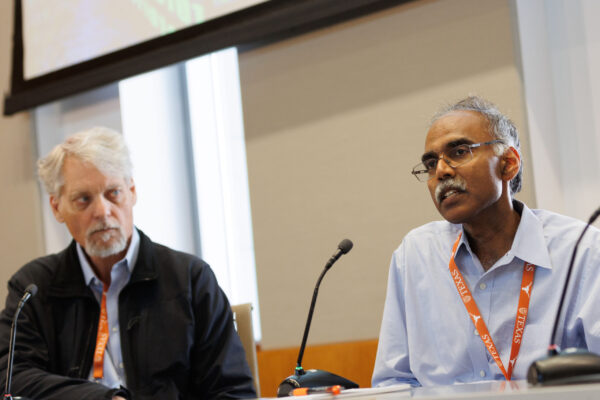The first annual Texas Defense Research Symposium recently brought together UT researchers, industry and Department of Defense (DOD) to discuss strategic AI and autonomy needs and develop next-generation solutions.
The symposium format merges the defense ecosystem’s key national security challenges with the University’s research capabilities including interdisciplinary efforts to address ethical and societal impact. DOD and industry attendees also toured Texas Advanced Computing Center (TACC) Vis Lab and Texas Inventionworks, participated in state-of-the-art demos from the Nuclear and Applied Robotics Group and met with award-winning, undergraduate student entrepreneurs from Paradigm Robotics who are advancing the safety of firefighters.
DOD panels
Army 2040: Ground Autonomy and the Future of Landpower
Army Futures Command and Army Applications Laboratory leadership participated in a panel that highlighted the tensions between future concepts and their technology investments against the requirements to field an Army capable of fighting in any theater of operation. Technology that is modular and contains open architectures that ease development and fielding will need to be balanced for the types of security and resiliency future systems require.
USAF / USSF: Air and Space Power with Autonomy
Discussions on the breadth of research requirements across the U.S. Air Force and U.S. Space Force. Cyber, networking, and the future of semi-autonomous or human-machine teaming in the air domain were front and center. Additionally, the 76th Software Group highlighted the potential partnerships for undergraduate and graduate workforce development and partnerships.
Austin Defense Innovation and Agency Ecosystem
The Austin defense innovation ecosystem is focused on identifying, partnering, and assisting in the transition of maturing technologies that can be scaled in the next one-to three years. The panel discussed opportunities to partner directly with mission-oriented units and their specific requirements as well as the broader DOD challenges.
UT panels
AI Learning in Dynamic, Uncertain and Adversarial Environments
Moderator: David Fridovich-Keil, Assistant Professor – Department of Aerospace Engineering and Engineering Mechanics
Kiril Avramov, Assistant Professor – Center for Russian, East European and Eurasian Studies
Takashi Tanaka, Assistant Professor – Department of Aerospace Engineering and Engineering Mechanics
Richard Tsai, Professor – Department of Mathematics
Panelists highlighted the breadth of research in adversarial learning going on at UT Austin, emphasizing the importance of reasoning about the control and flow of information as a key challenge for future research. The discussion focused on the compelling need to build mathematical models of information flow and corresponding algorithms for strategic reasoning in key settings of interest, such as disinformation campaigns.
AI with Limited Resources
Moderator: Radu Marculescu, Professor – Department of Electrical and Computer Engineering
Diana Marculescu, Department Chair and Professor – Department of Electrical and Computer Engineering
Nanshu Lu, Professor – Department of Aerospace Engineering and Engineering Mechanics
Jason Brown, Col (Ret), Applied Intuition – General Manager Government
John O’Grady, Army Modernization and Strategic Engagement – RTX
Igor Alvarado, Applied Research & Technology, Head of Business Development – Collins Aerospace
Discussions on the development and deployment of AI systems under constraints of computational and data resources. Potential effective strategies for creating AI models were discussed that can optimized for performance despite having limited computational power and communication capabilities. Additionally, the panel talked about the potential for innovation in AI within environments constrained by resources over the next decade. The panel concluded by exploring collaborations among academic institutions, industry, and military organizations, focusing on how these partnerships can advance the field of AI with limited resources.
Risk Management in Autonomy and AI
Moderator: Lori Magruder, Associate Professor – Department of Aerospace Engineering and Engineering Mechanics; Director – Center for Space Research
Amy Sanders, Associate Professor – School of Journalism and Media
Maruthi Akella, Professor – Department of Aerospace Engineering and Engineering Mechanics
Mitch Pryor, Research Faculty – Department of Mechanical Engineering; Director – Robotics Center of Excellence
Discussions on the conditions of uncertainty quantification, variable definitions of trust and risk management, and government transparency of autonomous systems and artificial intelligence. The panelists provided insights into large data modeling for autonomy and perception issues of autonomous systems in current defense-related projects.
AI and Autonomous System Learning and Self-Assessments
Moderator: Ufuk Topcu, Professor – Department of Aerospace Engineering and Engineering Mechanics
Srinivas Bettadpur, Professor – Department of Aerospace Engineering and Engineering Mechanics
Swarat Chaudhuri, Professor – Department of Computer Science
Atlas Wang, Associate Professor – Department of Electrical and Computer Science Engineering
Focused on the challenges and paths forward for verification, validations, and uncertainty quantification for autonomous systems. A particular emphasis was on integrating learning and pre-trained, multi-modal models for perception and decision-making. The panelists shared their views on what the conventional fields of study offer, where they may fall short, and the necessary advances.
Policy and Ethics of Autonomous Systems in National Security
Moderator: Ryan Evans – War on the Rocks
Matt Lease, Professor – School of Information
Sherri Greenberg, Assistant Dean for State and Local Government Engagement – LBJ School of Public Affairs
Peter Stone, Professor – Department of Computer Science, Director – Texas Robotics
Adam Klein, Senior Lecturer – School of Law; Director – Strauss Center for International Security and Law
Discussion about the complexities of the legal and ethical frameworks of AI, not only for the employment, but also how they can (or should) be embedded in all lines of research and education. The breadth of impact from the intelligence, governance, the use/employment and training of autonomous systems, to the scale, content, and transmission of large-language models into the growing complexity of systems is an important point in the system of systems approach required to solve national security related autonomy questions.




